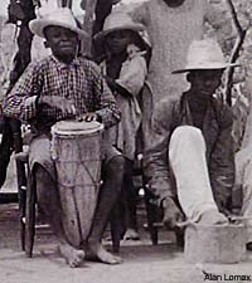
Haitian Musicians - by Alan Lomax
“These were recorded right after one American ‘adventure’ in Haiti, so there were enormous shifts in attitude there after that,” Averill says. “It was definitely a fervent period for nationalism and African orientation, with Haiti viewing itself as of African heritage rather than as a weird colony. So here we are following the last American occupation, and Haiti really has the challenge to get itself into governance shape to direct its own affairs and to change the global perceptions of Haiti.”
And into this stepped Alan Lomax, just 21 when he arrived, fresh off various projects with his father, folklorist and musicologist collector John Lomax, and determined to develop a comprehensive collection of African-rooted music in the Americas.
In 2005, ethnomusicologist Gage Averill found himself introducing pioneering African-American dancer Katherine Dunham at an event. Dunham, who passed away in 2006 at age 96, was being honored in part for her invaluable studies of music and dance in Haiti in the 1930s, delving deep into the history and aesthetics of arts forged in the island crucible fueled by the cultures and travails brought by African slaves. Haiti had served as one of the key way stations for the slave trade in the West, a history full of tragedy and oppression that nonetheless forged truly rich and unique culture and ultimately shaped key aesthetics throughout the Americas. When Dunham had been there, many of the old ways were dying in the growing shadow of the modern industrialized world.
Averill, currently professor of history and culture specializing in Caribbean studies at the University of Toronto, had for several years before the event been involved in a project to research and release material from the massive sound and film archives recorded in 1936 and ’37 by American song collector Alan Lomax during his trips to Haiti. The material, kept in the Library of Congress and long unexamined, was the results of an arduous adventure in which the young Lomax lugged cumbersome recording equipment around on buses (he had no private transportation on the visits) even while suffering from malaria. Despite all that, he was able to gather an unbelievable 1,500-plus recordings covering the full range of music: work songs, religious music, vodou and rara ritual, children’s songs, mérengue and other social dance styles among them.
Take ‘Mesi Papa Vensan’ (“Thank You Papa Vincent”), by Surprise Jazz, which is the first song on ‘Alan Lomax in Haiti,’ a collection being released Nov. 17 culled from the archives — 287 song, more than nine hours of music, on 10 CDs, plus six films Lomax shot at the same time.
Explains Averill, “Recorded in an elite club, this small ‘jazz’ orchestra with clarinet lead plays a popular tributary méringue song for the President of Haiti, Sténio Vincent, and the lyrics consist of a recitation of the ways that that the president had benefited the lives of Haitian common people. Jazz had come to Haiti with the American Marines and with recordings, and mixed with the urban form of the méringue, it was the music of choice in the dancing establishments along the waterfront in Haiti of the 1930s.”
Averill is expecting a lot of variations of that scene with the release of this great wealth of material films.
“This will have an interesting effect — I can’t say what — in Haiti itself,” he says. “It might change what people are singing, what vodou pop ensembles are performing. This additional impact in Haiti will be curious and interesting — I hope and think it will. People in Haiti have been hungry for this.”
With civil wars, poverty, long stretches of military rule, the nation’s history has at best been ignored on the island. Archives have been destroyed. But the advent in recent years of a stable government has created an environment that he believes will receive these materials with great interest.
“There’s a cultural ministry and whole nation willing to understand its history,” he says. “And suddenly we drop this large archives into their laps. Going to be fascinating to follow the path of this and see how it rolls out and what it changes in Haiti.”
This endeavor will get a high-profile assist. The project is being done under the auspices of the Haiti Repatriation and Cultural Preservation Project of the Lomax-founded Association for Cultural Equity — of which Lomax’s daughter Anna L. Wood is the director. And that in turn was selected for support by the Clinton Global Initiative and the Green Family Foundation.
But Averill already experienced some of this just in the course of researching the material with his colleague Louis Carl St. Jean.
“We would have a problem, something mentioned in a song about something, and we’d have no idea,” he says. “So Louis would say he’d call his aunt and she said, ‘I know an old mambo,’ and he’d get on the phone with a 78-year-old mambo and play the recording over the phone and get a comment. Old priests saying, ‘I can’t believe they sung that up there like that!’ Or ‘I thought that died out; I hadn’t heard that since I was a kid.’ When we bring this around, we’re playing the voices of ancestors from generations past. It’s a family reconnection project.”
It also shines a light on what was a very interesting time in Haiti.
Excerpt from Spinner.com post by Steve Hochman
Filed under: African Events, African News, General, pictures, Prose, world | Tagged: African heritage, Alan Lomax, Averell, culture, entertainment, folklore, Haiti, Haitian music, history, Louis Carl St. Jean, songs, video | 2 Comments »



